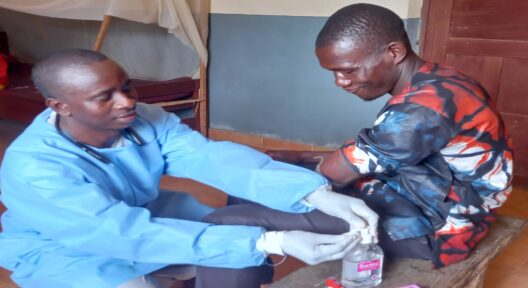AfroLabNet 2.0
Rapid Laboratory Response to Outbreaks of viral Haemorrhagic Fevers and other Emerging viral Diseases in sub-Saharan Africa

Context
Emerging and re-emerging infectious diseases, such as COVID-19 in 2021, Ebola virus disease in 2014 and human Mpox in 2023, pose a great threat to the global community not only from a public health perspective, but also from an economic and social standpoint. Furthermore, the changing climate and the destruction of ecosystems lead to increasing contact between humans, wildlife and other vectors, creating a higher risk of new disease outbreaks. It is therefore vital that countries are able to properly prepare for and respond to disease outbreaks and other public health emergencies. In West Africa, where many pandemic-prone pathogens are endemic, the infrastructure and capacities required to effectively prevent, treat and respond to outbreaks are still limited. Ensuring the availability of continuous funding, well-equipped laboratories and a sufficient number of trained staff is particularly challenging. The project therefore aims to expand fixed and mobile laboratory preparedness and response capacities for viral haemorrhagic fevers and other emerging viral diseases. Project staff work closely with in-country laboratories and train local staff so that they can perform high-quality diagnostics independently and safely. This will improve overall diagnostic and surveillance capacities and ultimately contribute to reducing the morbidity and mortality of such diseases in West Africa.
Objective
Maintaining and expanding stationary and mobile laboratory infrastructure and capacity for detecting viral haemorrhagic fevers and other emerging viral diseases in sub-Saharan Africa to improve preparedness and response.
In Cooperation with
- Irrua Specialist Teaching Hospital (ISTH), Nigeria
- Laboratoire des Fièvres Hémorragiques Virales de Guinée (LFHVG), Guinea
- Laboratoire des Fièvres Hémorragiques Virales de Cotonou (LFHV Cotonou), Benin
- Njala University (NU), Department of Environmental Health Sciences, School of Community Health Sciences, Sierra Leone
- Ministries of health of partner countries (see above)
- World Health Organization (WHO), Switzerland
- WHO Regional Office for Africa (WHO/AFRO), Republic of the Congo
- Global Outbreak Alert and Response Network (GOARN)
- European Civil Protection Pool (ECPP)
- Centre d’Information de Prospectives et de Conseils sur les IST/VIH/Sida, Bénin
- Federal Medical Centre (FMCO), Nigeria
Thematic priorities
Facts
Activities
-
Training and competence development
Training laboratory staff to perform high-quality diagnostics independently and safely; workforce development through training and technical guidance on various infectious disease agents.
-
Research and provision of evidence
Conducting studies on issues at the interface between humans and natural hosts of zoonotic viruses for the implementation of the One Health approach.
-
Networking and cooperation
Expanding and strengthening networks of regional laboratories across West African countries.
-
Procurement of goods and infrastructure development
Expanding the range of tests available for various infectious diseases.
-
Capacity development
Improving patient management and disease surveillance through frequent, accurate and rapid diagnostics performed in stationary and mobile laboratories.